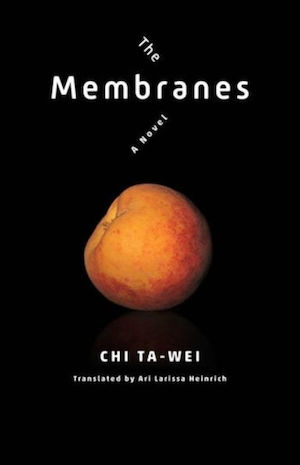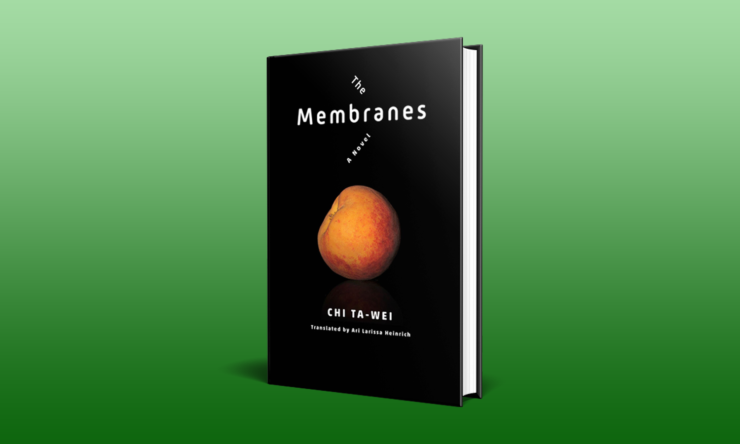Momo is the most celebrated dermal care technician in the T City undersea dome, with a curated list of clients and an intimate workspace she calls Salon Canary. However, after a journalist client nudges her to do a public interview, Momo’s estranged mother contacts her again. She asks to meet for the first time in two decades—the first time since Momo left for boarding school. The possibility of reuniting with her mother provokes a cascade of complicated memories and feelings, which Momo frames through questions about the nature of her attachments, her memories, and even the flesh of her own body.
First published in Taiwan in 1995, The Membranes is a classic of queer speculative fiction in Chinese—one that is, with this agile translation from Ari Larissa Heinrich, accessible to an English-language readership for the first time. As part of Columbia University Press’s “Modern Chinese Literature from Taiwan” series, this edition of the novel also comes with an excellent afterword titled “Promiscuous Literacy: Taipei Punk and the Queer Future of The Membranes.” The short essay conversationally explores the time and place that Chi Ta-Wei was writing from, an explosion of artistic and cultural development in mid-90’s Taiwan after the end of martial law—and reflects on what it’s like to read the book now, twenty-five years later.
I would’ve been around six years old when the original edition of The Membranes was published, near the same age as Momo when she goes into seclusion at the hospital. As the novel opens, though, she is about to turn thirty—which I also did, during the earlier portion of COVID-19 quarantines. Reading Chi’s novel this spring, with its particular attachment to the concepts of membranes and permeability, filled me with a striking feeling of synchronicity. In isolation, I’ve been starving for contact; for a taste of sublime intensity. Chi’s novel reaches across time to massage at that loneliness of being, to pluck at the question of what our humanness relies on. Are we made of stories, or of other people’s affections, or of our electric strange imaginations?
Buy the Book


The Membranes
Obvious, eerie echoes of contemporary political issues refract through the science-fictional future world Momo inhabits. The ravages of climate change might have pushed humans beneath the ocean, but otherwise, our habits remain unchanged. Colonialism and expansionism retain their power, with “a full three quarters of the vast Pacific Ocean […] distributed among only the United States, Japan, and China” (25) while smaller nations are left to scrabble. Guerilla wars are waged on the surface through drones and cyborgs while people “watch the spectacular unending carnage of gladiators battling in barren hellscapes through a variety of electronic devices.” The lines between corporations and nations are nastily slippery, especially with regard to the profits of war-mongering.
Then there are the smaller but no less prescient details that leapt out at me. For example: the rise of digital books as a form of mass culture, though on laserdiscs, and the constant isolation of an oversaturated media landscape with everything consumed on your computer… as well as others that are miserably not-yet-here, such as the one that made my heart clench regarding “the universal success of the AIDS vaccine in 2009” (18). Even silly moments, such as Momo’s grumpiness over the ubiquity of video-calls, struck me harder given the experiences of pandemic-restricted life. I laugh-cried over her thought that videochats are “noisy, an invasion of privacy” and that she especially hated receiving them while showering: “Did they really expect her to come running for the phone with her base ass hanging out?” (8).
The power of The Membranes isn’t in the unsettling accuracy of its extrapolations, though—it’s in what Chi does with those observations through the characters. Queerness (and trans-ness!) as both a norm and a subversive potentiality reverberate throughout The Membranes. Gender and desire, bodies and their flesh, intimate detachment and emotional consumption are all deeply significant to the narrative plot. As the novel progresses, the reader is immersed within Momo emotionally and physically. Her role as a dermal care technician means she puts her hands all over her clients’ nude bodies while listening to their intimate secrets. However, she allows no one to touch her or get close to her—though she once had a companion, Andy, whom she was passionately attached to.
[Spoilers follow.]
The descriptions of the hospital ward, her hermetic isolation made necessary by the virus devouring her cells and making her weak to infections, struck bone for me. While the novel notes that the HIV/AIDS pandemic had been ended, the reader understands that The Membranes was published in 1995—and written prior to the introduction of the retroviral cocktail that made the disease survivable for people who had access (financial and geographic). As shown through disease, human flesh is scarily permeable. Momo bites off Andy’s finger and then offers Andy her penis to bite off… then later, when she arises from a major surgical intervention sans Andy, she comes to understand that her companion was sacrificed to fill her with more functional organs. Andy’s cells remain within her, carried in her flesh; or, more accurately, she is carried in Andy’s flesh.
The turn at the end, however, comes when the reader learns that Momo’s whole life has been a fiction written by her mother. Momo herself is a brain in a crystal box, an organic mind that has been serving as an indentured operator of a cyborg body for a weapons conglomerate for two decades. Those stories were crafted with adoration and care, but she interpreted them through her mind—and filled in the gaps with a mother who abandoned her. As Chi wrenches the reader’s perspective outside of the stories fed to Momo, locating us instead with her grieving mother, our minds also become dislocated and disoriented. The membrane between the real and the fictional has become permeable.
Boundaries stand as an obvious motif throughout: the skin of a peach splitting to reveal an infant to her two mothers; the digital voyeurism of Momo porting data from her clients’ skins through her own; the thin barrier between the ocean and human habitation within it; the hypodermic nature of reading as the text gets under your skin. Luxurious, exacting prose builds and disrupts those membranes at turns—Heinrich’s translation retains Chi’s combined sharpness and liquidity, which makes for a reflexive reading experience. Repetition and reflection, observations delivered multiple times with slight tonal shifts, build us cleverly toward the unexpected turn of the novel’s ending.
Books are all time-capsules, of course, but Chi’s novel offers an exquisite dual experience—because while The Membranes is a modern classic, it hasn’t lost an ounce of its provocative significance. As a gently incisive puzzle-box it works to pry at the readers’ own emotions about the nature of stories and how we’re made of them; as a novel of queer attachment, it explores how we attempt to connect to one another through endless membranes—and often fail to do so. Furthermore, as a text that grows from the specific space and place of ‘90s queer Taiwan, the novel requires an American reader to decenter their presumed significance. Overall, The Membranes is a brilliant work of craftsmanship, and I’m deeply honored to finally be able to read it in translation after all these years.
(P.S.: If you’re curious for more context, there’s also a talk you might appreciate watching between Heinrich and Chi through the UCLA Center for Chinese Studies.)
The Membranes is available from Columbia University Press.
Lee Mandelo is a writer, critic, and editor whose primary fields of interest are speculative fiction and queer literature, especially when the two coincide. They have two books out, Beyond Binary: Genderqueer and Sexually Fluid Speculative Fiction and We Wuz Pushed: On Joanna Russ and Radical Truth-telling, and in the past have edited for publications like Strange Horizons Magazine. Other work has been featured in magazines such as Stone Telling, Clarkesworld, Apex, and Ideomancer.










